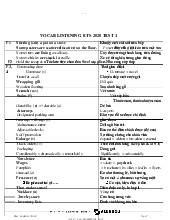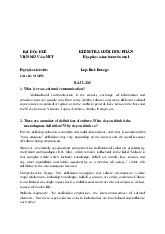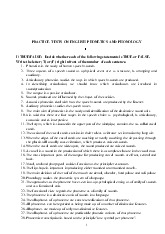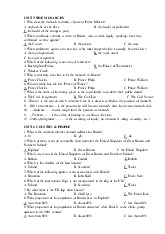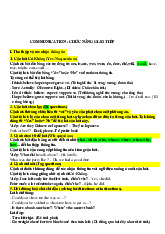English A12(ĐHH)
Danh sách Tài liệu
-
Từ vựng ngữ pháp môn tiếng anh | trường Đại học Huế
174 87 lượt tải 10 trangP1, Stirring (stir) a pot on a stove :Khuấy một cái nồi trên bếp. Some posters are scattered (scatter) on the floor. Poster :được thả rải rác trên mặt sàn. Some trees are lining a walkway: Cây được trồng thành hàng trên đường. Some vehicles are stuck in traffic:Xe cộ tắt nghẽn trong giao thông. P2 , Hold the reception :Tổ chức tiệc chào đón, Steel suppliers :Nhà cung cấp thép. P3, Commuting time: Thời gian đi lại. P4 , Commute (v) , Commute = travel. Transfer a call : Chuyển tiếp một cuộc gọi. Wrapping gift :Gói quà, Wooden flooring:Sàn nhà bằng gỗ. Scratch (n,v) :Vết xước. Tài liệu giúp bạn tham khảo, ôn tập và đạt kết quả cao. Mời bạn đọc đón xem!
Danh mục: Đại học HuếMôn: English A12(ĐHH)Dạng: Tiểu luậnTác giả: VietJack1 năm trước -
Top 3 câu hỏi tự luận | môn Tiếng anh có đáp án | trường Đại học Huế
834 417 lượt tải 4 trang1. What is cross-cultural communication?
Multicultural communication is the contact, exchange of information and emotions between people who from many similar cultures and many different cultural expressions in a particular region or in the world in general. Like between the East and the West, between Vietnam, Japan, America, Arabia, Europe, etc.
2. There are a number of definitions of culture. What do you think is the mostadequate definition? Why do you think so?
3. What are the benefits of learning cross-cultural communication for your work and for your life?
Tài liệu giúp bạn tham khảo, ôn tập và đạt kết quả cao. Mời bạn đọc đón xem!
Danh mục: Đại học HuếMôn: English A12(ĐHH)Dạng: Tiểu luậnTác giả: VietJack1 năm trước -
Ngân hàng câu hỏi trắc nghiệm | môn Tiếng anh | trường Đại học Huế
152 76 lượt tải 8 trang1. Phonetics is the study of human speech sounds.
2. Three aspects of a speech sound as a physical event are: a- structure, b- arranging and cauditory.
3. Articulatory phonetics studies the ways in which speech sounds are produced.
4. In describing articulation, we should know which articulators are involved in soundproduction.
5. The tongue is a passive articulator.
6. Sounds produced are influenced by the shapes of the cavities.
7. Acoustic phonetics deal with how the speech sounds are produced by the listener.
8. Auditory phonetics studies the speech waves.
9. The main aim of phonetics is the study and identification of the distinctive sound unit.
Tài liệu giúp bạn tham khảo, ôn tập và đạt kết quả cao. Mời bạn đọc đón xem!
Danh mục: Đại học HuếMôn: English A12(ĐHH)Dạng: Trắc nghiệmTác giả: VietJack1 năm trước -
Ngân hàng câu hỏi trắc nghiệm| môn Tiếng anh | trường Đại học Huế
159 80 lượt tải 22 trang1. Who does the monarch normally choose as Prime Minister? 2. When somebody commits a crime in Britain, who or what, legally speaking, have they committed a crime against? 3. When parliament agrees on a new law, what must happen before it actually becomes law? 4. Which of the following is not a royal residence? 5. Who is presently next line to be the monarch in Britain?6. Who presently has the title 'Prince of Wales'? 7. What is the name of the money given to the royal family to perform their public duties? 8. ..Throne.. is the seat on which a monarch sits (it is used to symbolize the position of monarch) 9. ...Heir to the throne.... is the person who will become monarch after the present monarch dies. Tài liệu giúp bạn tham khảo, ôn tập và đạt kết quả cao. Mời bạn đọc đón xem!
Danh mục: Đại học HuếMôn: English A12(ĐHH)Dạng: Trắc nghiệmTác giả: VietJack1 năm trước -
Ngân hàng câu hỏi trắc nghiệm về communication: Chức năng giao tiếp | môn Tiếng anh | trường Đại học Huế
776 388 lượt tải 19 trangCâu hỏi: bắt đầu bằng các trợ động từ: am, is, are, was, were, do, does, did, will, would, have, may, might, can,could....
Câu trả lời: bắt đầu bằng “Yes” hoặc “No” và đưa thêm thông tin.
Ta cũng có thể trả lời bằng:
- I think/believe/hope/expect/guese so. (Tôi nghĩ/ tin/ hi vọng/ mong/ đoán thế.)
- Sure/ Actually/ Of course/ Right...(Dĩ nhiên/ Chắc chắn rồi.)
- I don’t think/ believe/ expect/ suppose so. (Tôi không nghĩ/ tin/ mong/ cho rằng the.)
- I hope/believe/guese/suppose not. (Tôi hi vọng/ tin/ đoán/ cho là không.) - I'm afraid not. (Tôi e rằng không.)
Tài liệu giúp bạn tham khảo, ôn tập và đạt kết quả cao. Mời bạn đọc đón xem!
Danh mục: Đại học HuếMôn: English A12(ĐHH)Dạng: Trắc nghiệmTác giả: VietJack1 năm trước
